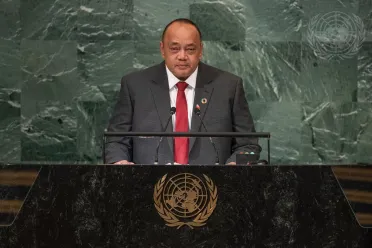Statement
Statement summary
SIAOSI ‘OFAKIVAHAFOLAU SOVALENI, Prime Minister of Tonga, called for urgent action to overcome the severe economic, financial and social impacts of the COVID‑19 pandemic, as well as accelerate action on climate change, ocean health, energy transformation, and the sustainable use of natural resources, among others. Calling for a peaceful resolution of the conflict in Ukraine, he said despite being far away from the conflict, Tonga feels its ripple effects through higher costs of fuel, food, and basic supplies. Inflation is double-digit, he cautioned, noting that his country has not experienced such inflation rates in decades. The existential threats from climate change, pandemics, and conflict have increased, he warned, adding that the international community must keep its promises to small island developing States.
Already three decades have elapsed since small island developing States called for an index recognizing their special circumstances and vulnerabilities, he continued. However, the international financial system has used measures not necessarily adapted to those islands’ special challenges, and their ecological and economic vulnerabilities. “This has limited our access to appropriate financing, debt relief and aid,” he asserted, pointing out that Tonga — like many of its Pacific neighbours — has faced natural disasters of unprecedented severity and frequency. All Tongans will forever recall 15 January 2022 when the Hunga-Tonga-Hunga Ha’apai volcano erupted.
The explosion was of an intensity so great that some research compares it to the impact of a nuclear explosion, he continued. Plumes of hot gas, ash, and water vapour were projected into the atmosphere, reaching a height of 36 miles. The ensuing tsunami devastated Tonga’s economy. Several islands were completely or severely destroyed; people were displaced and then evacuated to neighbouring islands. The volcanic eruption and tsunami cut access to basics for people and cut its communications — a lifeline for an island nation. The widespread socioeconomic damage and loss of lives is estimated by the World Bank at 36.4 per cent of Tonga’s gross domestic product (GDP). In this context, he reiterated his commitment to reduce the risks and the harmful effects of natural disasters, particularly through risk-informed development efforts and enhancing disaster preparedness for effective response.
Highlighting that Tonga has one of the world’s highest rates of non-communicable diseases, he noted that cardiovascular disease, cancers, diabetes, and chronic respiratory diseases account for approximately 80 per cent of deaths in Tonga. In that regard, he drew attention to his Government’s goal of reducing such deaths by one third by the year 2030. More so, climate change continues to be the single greatest existential threat facing the Blue Pacific. The adverse impacts of climate change make Tonga the third most vulnerable country in the world, he stressed, spotlighting threats to his country’s territorial integrity, land, water, health, infrastructure, food security, biological diversity, livelihoods, and ecosystems. Calling for this issue to be a permanent item on the Security Council’s agenda, he said that whether it is sea-level rise, loss of territory, or mass migration, this is a trigger for violence and a threat to peace and security.
On ocean protection, he underscored the importance of the conservation and sustainable use of the ocean and its resources, as 99 per cent of Tonga’s sovereign territory is the ocean. Highlighting his Government’s aspiration to fight against illegal, unreported and unregulated fishing activities, he spotlighted the Tonga Ocean Management Plan 2021. Underscoring the threat posed by sea-level rise to the Blue Pacific, he stressed that climate change-induced sea-level rise must not challenge the maritime zones delineated under 1982 United Nations Convention on the Law of the Sea as reflected in the 2021 Declaration on Preserving Maritime Zones in the face of Climate Change-Related Sea-Level Rise.
Full statement
Read the full statement, in PDF format.
Photo

Previous sessions
Access the statements from previous sessions.
